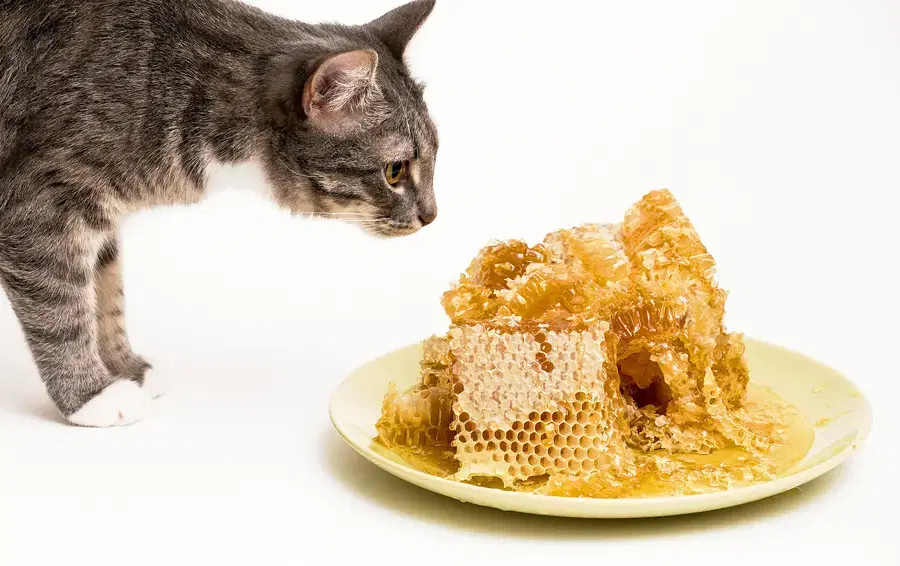We have grown up hearing about the benefits of honey, for soothing a soar throat or for its health benefits as a great sugar substitute. But is honey also suitable to add to a cat's diet?
Is it safe for a cat to have honey?
While honey is not considered toxic to cats, you should not give your cat honey. The cons of giving a cat honey outweigh any pros. This is because cats aren't able to break down the sugar content in honey.1
Can cats have honeydew melon?
Honeydew is often enjoyed by us in the form of salads, juice, and dessert. Luckily, this fruit is not considered toxic to cats, so you can safely give your cat a bite to try.
Do cats like honey?
It is easy to assume that cats would enjoy honey as much as we do, but actually, they don't have the taste receptors to detect sweet flavors.1 Some cats may be curious about trying honey because of the interesting texture, but it is not recommended to let your cat have any honey.
Is honey good for cats?
Because many of us grew up hearing about the benefits of having honey, it's easy for us to jump to the assumption that honey would also be good for our pet. Unfortunately for cats, the high sugar content in honey can cause digestive issues and an upset stomach when consumed.1
Do cats like Honeydew?
Cats might not have a particular attraction to honeydew as cats are carnivores and plant-based foods are not a natural part of their diet. But it is possible some cats might be curious about the texture and taste. Honeydew is non-toxic to cats and can be safe to give your cat in small quantities.2
Is honeydew good for cats?
Honeydew is a kind of melon that is safe for cats to eat in moderation. Cats may not gain much in terms of nutritional value from honeydew, but honeydew consists of 90% water and provides electrolytes, which can help avoid dehydration. Honeydew is also low in calories and can provide minerals and vitamins that can be beneficial to cats.2
How much honeydew is okay to give a cat?
You should only give your cat fruits as an occasional treat, and treats should never make up more than 10% of your cat's daily diet. It's best to cut the honeydew into bite-sized pieces and only give your cat a one to two pieces to enjoy.
What happens if a cat eats too much honey?
Instead of giving your cat any honey, let them try a few of alternatives to see what they like best. Honey, if consumed, can lead to -–
Digestive upset
Weight gain, obesity, and diabetes due to the high sugar content
Allergic reactions can cause swelling and respiratory issues.
Nutritional imbalances as it does not contain any nutrients for cats
How can I introduce honeydew to my cat's diet?
The majority of a cat's nutritional requirements should come from meat as cats are carnivorous creatures. However, if you want to feed melon to your cat as an occasional treat, start by offering them a small amount and monitor their reaction. Look out for any signs of an upset stomach or an allergic reaction.
Don't be surprised if your cat doesn't seem interested in trying honeydew, because it is not a natural part of their diet, some cats may show some interest while others avoid trying it. Here are a few tips on how to add honeydew to your cat's diet:
Prepare Fresh Honeydew: Get a nice ripe honeydew and remove its skin and seeds.
Bite-sized Pieces: Take the fleshy parts and cut them into small bite-sized pieces for your cat.
Monitor for Reactions: Look for any signs of digestive upset or allergies in your cats after feeding them honeydew, If you notice any signs of a negative reaction, contact your vet immediately.
Limit the Quantity: Honeydew never makes up a large part of your cat's diet. Limit your pet to a few pieces once or twice a week.
Avoid Additives: Do not add any seasoning or additives to the honeydew. It is best to keep it plain when preparing it for your pet.
Consult with Your Veterinarian: It's always best to consult your vet before introducing any new foods to your cat's diet.
What are the downsides of feeding honeydew to a cat?
Even though honeydew is considered safe to feed to cats in small quantities, in excess it can lead to a few health problems -
Digestive Upset: Eating too much honeydew can cause a cat to experience diarrhea or vomiting because of the fibers and natural sugar content in the fruit. This is why it's important to make sure to limit your cat to only a few pieces at a time.
Allergies: If you see your cat itching, experiencing swelling, or showing signs of gastrointestinal discomfort after eating honeydew, they may be having an allergic reaction. Contact your vet immediately.
Obesity: The high sugar content in honeydew can cause weight gain and ultimately lead to obesity and diabetes.
Dental Health: The high sugar content in honeydew can cause dental issues if eaten too often.
Conclusion
While both honeydew melon and honey share sweetness, cats lack the receptors to actually taste it. This might explain why most felines aren't particularly drawn to either. However, some curious kitties might be intrigued by the texture or scent of honeydew. It's okay to offer a small, seedless piece as a rare treat, but remember: honey is a no-go! Its high fructose content can make your feline friend very sick.

As Spot’s resident cat enthusiast, I am dedicated to researching and sharing information that helps pet owners take the best care of their pets. Pet ownership comes with it’s share of challenges, but my goal is to help make this journey easier.
"What Human Foods Can Cats Eat? " Home Alive Pets, www.blog.homealive.ca, Feb. 02 2024.
"Nutrition and Pancreatic Disease in Cats" VCA Canada, www.vcacanada.com, Feb. 02, 2024.












